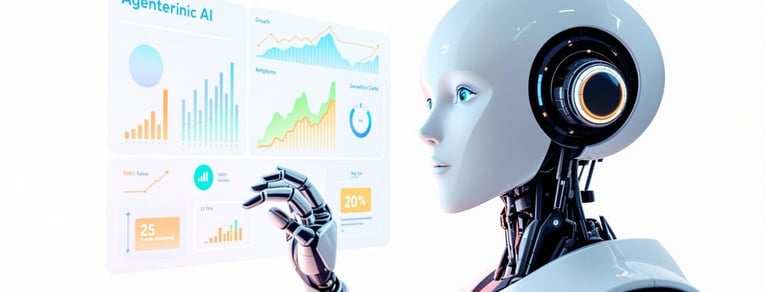The Rise of Agentic AI: How Autonomous Systems are Transforming Business
Explore how Agentic AI is revolutionizing business operations by enabling autonomous decision-making, enhancing productivity, and reshaping enterprise workflows. Learn about its impact on various industries and the future of work.
TECH
8/17/20253 min read
Introduction
In the ever-evolving landscape of technology, Agentic AI stands out as a transformative force. Unlike traditional AI systems that rely heavily on human input, Agentic AI introduces autonomous agents capable of making decisions, learning from experiences, and executing tasks with minimal human intervention. This shift is not just a technological advancement; it's a paradigm change in how businesses operate, innovate, and deliver value.
What Is Agentic AI?
Agentic AI refers to intelligent software entities—known as agents—that can perceive their environment, make decisions, and perform tasks autonomously to achieve specific goals. These agents are designed to:
Understand complex objectives: They can interpret and process intricate business requirements.
Adapt to dynamic environments: They adjust their actions based on changing conditions and data inputs.
Collaborate seamlessly: They work in tandem with other systems and humans to accomplish tasks efficiently.
This capability is powered by advancements in machine learning, natural language processing, and real-time data processing, enabling agents to function effectively in diverse business contexts.
The Business Impact of Agentic AI
1. Enhanced Operational Efficiency
Agentic AI automates complex workflows, reducing the need for manual intervention. For instance, in customer service, AI agents can handle inquiries, process requests, and resolve issues without human involvement, leading to faster response times and improved customer satisfaction.
2. Data-Driven Decision Making
By analyzing vast amounts of data in real-time, Agentic AI provides actionable insights that inform strategic decisions. This capability allows businesses to anticipate market trends, optimize supply chains, and personalize customer experiences with unprecedented accuracy.
3. Cost Reduction and Resource Optimization
Implementing Agentic AI can lead to significant cost savings. Automation of routine tasks frees up human resources for more strategic roles, while AI-driven optimization ensures that resources are allocated efficiently, minimizing waste and maximizing output.
4. Scalability and Agility
As businesses grow, maintaining consistent performance can be challenging. Agentic AI systems can scale operations seamlessly, adapting to increased workloads without compromising quality or efficiency. This agility is crucial in today's fast-paced business environment.
Industry Applications
Healthcare
In healthcare, Agentic AI assists in diagnosing diseases, personalizing treatment plans, and managing patient data. AI agents can analyze medical records, identify patterns, and recommend interventions, enhancing the quality of care and operational efficiency.
Finance
Financial institutions leverage Agentic AI for fraud detection, risk assessment, and algorithmic trading. AI agents can process transactions in real-time, identify anomalies, and make investment decisions, improving security and profitability.
Retail
Retailers utilize Agentic AI to manage inventory, forecast demand, and personalize marketing strategies. AI agents analyze consumer behavior and market trends to optimize product offerings and enhance customer engagement.
Manufacturing
In manufacturing, Agentic AI monitors equipment performance, predicts maintenance needs, and streamlines production processes. AI agents can detect faults, schedule repairs, and adjust operations, reducing downtime and increasing productivity.
Challenges and Considerations
While the benefits of Agentic AI are substantial, businesses must address several challenges:
Data Privacy and Security: Ensuring that AI agents handle sensitive information responsibly is paramount.
Integration with Legacy Systems: Incorporating AI into existing infrastructures can be complex and resource-intensive.
Ethical Implications: Defining the boundaries of AI autonomy and maintaining human oversight are critical to prevent unintended consequences.
The Future of Agentic AI
Looking ahead, Agentic AI is poised to become an integral part of business strategies. As technology advances, AI agents will become more sophisticated, capable of handling increasingly complex tasks. The future will likely see:
Wider Adoption Across Industries: More sectors will implement Agentic AI to enhance operations and competitiveness.
Improved Human-AI Collaboration: AI agents will work alongside humans, augmenting capabilities and fostering innovation.
Evolving Regulatory Frameworks: Governments and organizations will develop policies to govern AI use, ensuring ethical and responsible deployment.
Conclusion
Agentic AI represents a significant leap forward in the realm of artificial intelligence. By enabling autonomous decision-making and task execution, it empowers businesses to operate more efficiently, make informed decisions, and adapt swiftly to changing environments. As we move into this new era, embracing Agentic AI will be crucial for organizations aiming to maintain a competitive edge and drive sustainable growth.


